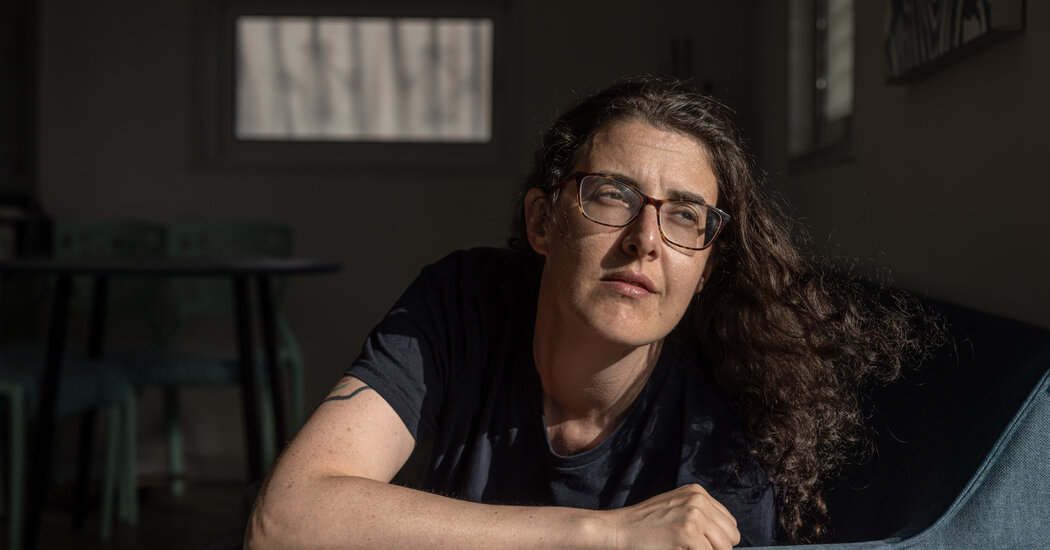They handcuffed her, hung her up from the ceiling and beat her senseless. They electrocuted her and forced her into positions that injured her back and shoulders. When she lost consciousness, they threw water on her face to wake her so the torture could resume.
Elizabeth Tsurkov endured two and a half years of captivity in Iraq, held in solitary confinement by an Iran-backed militia. Ms. Tsurkov, 38, said it was a marathon of psychological torment, but the most excruciating were the first months, when she suffered beating after beating by her captors, as well as sexual assault and other horrors.
“They whipped me all over,” she said in her first interview since being freed in September. “They basically used me as a punching bag.”
Barely able to sit up because of her injuries, Ms. Tsurkov, an Israeli Russian doctoral student at Princeton University, spoke while lying down in a friend’s home, the occasional jolt of pain forcing her to shift positions. During hours of interviews with The New York Times, she shared in mostly calm tones, sometimes interrupted by tears, the harrowing story of her kidnapping, captivity and release.
Ms. Tsurkov said she was held by Kataib Hezbollah, the most powerful of the Shiite, Iran-backed paramilitary groups that hold sway in Iraq. She said she had decided to share her story to give voice to Iraqis who have been tortured by the group.
Her experience speaks to how freely Kataib Hezbollah, which the United States has designated as a terrorist organization, has been able to operate in Iraq. While thousands of the militia’s members draw salaries from the Iraqi state, the government has little, if any, influence over its activities.
Ms. Tsurkov’s personal account of her captivity is consistent with what she told the doctor at Sheba Medical Center in Israel who treated her after her release and who said that she had suffered nerve damage that might be permanent. Her medical records, reviewed by The Times, also detail extensive injuries related to torture, saying she needs “long-term physical and psychological rehabilitation” in light of the “severe damages and complex trauma.”
U.S. and Israeli officials confirm that Kataib Hezbollah kidnapped and tortured her, though they do not know all the details. The officials spoke on the condition of anonymity to discuss sensitive matters.
After her release, Kataib, in a statement, claimed knowledge of her captivity and shared details that she had provided in forced confessions, suggesting the group had held her. The militia declined to respond to a detailed inquiry.
The Iraqi prime minister’s office said that it was “committed to holding accountable any party or individual involved in acts of kidnapping or torture.”
Like many other hostages, her fate would quickly turn under diplomatic pressure, with the Trump administration proving instrumental. The administration pressed top Iraqi officials about her case, dispatching envoys to Baghdad to demand progress. A businessman and friend of President Trump, Mark Savaya, who had played a crucial role and would soon become the special envoy to Iraq, accompanied her on a flight to Cyprus, where she was transferred to Israeli military aircraft to take her home.
“I genuinely believe I would have died if they had not engaged so consistently and with such incredible determination,” Ms. Tsurkov said.
The Kidnapping
Ms. Tsurkov’s decision to enter Iraq was unusual for an Israeli, and risky.
Israel and Iraq are hostile nations with no diplomatic relations. Much of Iraq’s leadership is close to Iran, Israel’s bitter enemy.
But Ms. Tsurkov had gone to Iraq several times, researching the Shiite movement led by the influential cleric Muqtada al-Sadr. She always took precautions, she said: traveling on her Russian passport, presenting herself as Russian and avoiding contact with armed groups.
On March 21, 2023, Ms. Tsurkov planned to meet a woman at a coffee shop at about 9 p.m. in central Baghdad. The woman had introduced herself over WhatsApp, asking for help researching the Islamic State and saying they had a mutual friend.
The woman did not show up. In retrospect, Ms. Tsurkov thought the appointment was a setup.
As she walked home, a black S.U.V. pulled up next to her and several men forced her into the back seat. She said she had called out for help and tried to escape, but the kidnappers responded by beating and sexually assaulting her. (The Times agreed not to disclose the specifics of her sexual assault.)
“They started twisting my pinkie, almost breaking it,” she said. “So I thought resisting more was pointless.”
As they drove, the kidnappers zip-tied her hands, placed a bag on her head and took her phone. They stopped and forced her into the trunk of a car. Roughly half an hour after her abduction, they arrived at a big house.
She would spend the next four and a half months there, in a windowless room with two cameras, underfed and alone.
At first, her kidnappers were unaware she was Israeli, and it seemed they had abducted her for a ransom, she said. A month into her captivity, her situation deteriorated, when they found proof of her Israeli identity on her phone. They accused her of being an Israeli spy, which she and Israeli officials who spoke to The Times have flatly denied.
She pleaded with them to read her many posts and articles online supporting Palestinian rights and criticizing the Israeli government. But they were unconvinced.
When she did not confess, she said she was “strung up and tortured.”
She said she had soon begun giving her captors fabricated admissions to stop the beatings.
She focused on inventing believable “confessions” that would not imperil Iraqis. Her first was that she had met a French journalist at a Baghdad coffee shop two years earlier to organize antigovernment protests.
Her interrogators seemed to buy it. After she told them the tale, they lowered her from suspension, allowed her to sit, fed her and told her to rest.
Later that same day, the top jailer, known to the others as “the colonel,” groped a tattoo on her thigh and threatened her with rape. “He was very filthy and very obsessed with sex.”
Her interrogators constantly menaced her with such threats but did not follow through on them, she said.
Ms. Tsurkov said one of the worst days of torture came in July 2023, when the kidnappers asked about her service in Israel. She lied to the captors, fearful of what would happen if they knew the truth, and said she had served in a hospital. She told The Times that she had been a low-level conscript in the military intelligence directorate two decades ago.
She said that two jailers known as Ibrahim and Maher beat her repeatedly, until she eventually told the truth.
“This tooth is missing because of that,” she said, pointing to a gap in her mouth.
‘I Never Saw the Sun’
On July 5, 2023, the Israeli government issued its first public acknowledgment that Ms. Tsurkov had been kidnapped, saying “we hold Iraq responsible for her fate and safety.”
A month later, she was moved without warning or explanation to a different location.
The change came, she said, “by the grace of God.” Her new captors did not torture her and brought in a male nurse to attend to her. They brought her books, notebooks, a television and an Arabic thesaurus. The food was varied and plentiful. In June 2024, they remodeled her quarters, giving her access to a kitchen and a bathroom.
But she was still in solitary confinement, in a windowless third-floor room, and would be for more than two years.
“I never saw the sun,” she said.
She and Israeli officials think she was at a Kataib Hezbollah base near the Iranian border, an area beyond Iraqi government control. During Israel’s 12-day bombing campaign against Iran this summer, she said, some strikes were close enough to shake the building.
Shortly after arriving at the base, the nurse suggested writing about the torture, an exercise she found therapeutic. The commander responded that it was “haram,” or prohibited, to hit women.
She later told them her confessions had been false. They seemed to believe her, she said.
The militia initially demanded hundreds of millions of dollars in ransom, which was not considered seriously, according to U.S. and Israeli officials, both current and former.
In November 2023, she appeared in a video that aired on Iraqi television, providing the first public proof that she was still alive.
Seated on a couch, Ms. Tsurkov, who was told what to say, said in Hebrew that she worked for Israeli intelligence and the C.I.A. She used coded messages to convey the cruelty she had suffered.
To signal she had been electrocuted, she claimed falsely to have lived in the Gan HaHashmal neighborhood, “hashmal” being Hebrew for electricity. She said she had invented names for her supposed intelligence handlers that were wordplay for “torture” in Hebrew, English and Russian, including “Ethan Nuima.” (E. Nuim sounds like “inuim,” the Hebrew word for torture.) Those names did not make it into the broadcast video.
As the many months passed, Ms. Tsurkov, in constant pain from her injuries, became despondent and began to question the value of surviving. But her analytical mind kept working, assessing and strategizing. She mapped out her doctoral thesis in a notebook, along with ideas for articles.
She caught occasional glimpses on television of people campaigning for her release, including one of her sisters being interviewed, which lifted her spirits.
The Release
In early September, she was driven out of the base, blindfolded, to another location. It was so sudden that she left behind her notebook with her doctoral plans.
The next day, Sept. 9, after 903 days in captivity, she was driven to a garage in Baghdad and turned over to an Iraqi official in a waiting car.
The official told her in English that she was now safely in the hands of the Iraqi government. He took her to an opulent guesthouse where she was examined by female Iraqi doctors — the first women she had had contact with since her kidnapping.
A man walked into the guesthouse and introduced himself to Ms. Tsurkov as a friend of Mr. Trump. It was Mr. Savaya, one of the people she credits most for her release.
Mr. Savaya said in an interview that he had told the prime minister of Iraq, Mohammed Shia al-Sudani, that “we need to fix this big issue” and release Ms. Tsurkov.
Since reuniting with her family, Ms. Tsurkov has tried to piece together how her release was secured.
Israel had sought American help. Adam Boehler, a U.S. hostage envoy, became a staunch advocate, campaigning on social media and challenging Mr. al-Sudani to do more. Mr. Boehler barged into a meeting in Baghdad with Mr. al-Sudani, uninvited, according to three people with knowledge of the matter who spoke on the condition of anonymity to discuss sensitive diplomacy.
Massad Boulos, a senior adviser at the State Department, had met with the Tsurkov family last spring and promised to try to find another sign of life.
What Mr. Savaya told the Iraqi prime minister is unclear.
Ms. Tsurkov and two of her siblings said Mr. Savaya told them days after her release that he had informed Mr. al-Sudani that if she was not let go in a week, the United States would target Kataib.
Ms. Tsurkov said she believes that Israel’s assassinations over the past year or so of senior Lebanese Hezbollah, Hamas and Iranian officials had rattled Kataib, and that she had become more of a liability to them than an asset.
Mr. Savaya denied delivering such a threat.
The White House did not comment directly on Mr. Savaya’s involvement, saying in a statement that Mr. Trump “is always concerned about Americans detained abroad” and that he was “willing to leverage our country’s strength and his negotiating skills to intervene in this case.”
The Iraqi prime minister’s office said “complex diplomatic and humanitarian efforts” by official Iraqi parties resulted in her freedom, adding that “external threats or pressures had nothing to do with the Iraqi decision.”
Hours after reaching the villa in Baghdad, Ms. Tsurkov went to the U.S. Embassy. Officials there connected her by video call to her sisters, Emma and Avital, as well as to Mr. Boehler.
“I asked her: ‘Are you alive? Because I buried you so many times in my head,’” Emma said. “She said she was OK, but she would need medical care.”
When she arrived in Israel for treatment, she was in such pain that she asked to be wheeled into the hospital on a gurney. The doctors persuaded her to walk in, with help, to feel that she was returning unbowed, not as a broken person.
After her release, a statement appeared on a Telegram account under the name of Abu Ali Al-Askari, the Kataib spokesman, about Ms. Tsurkov. The group did not admit to abducting her, but it recounted details of her “confessions” and identified the fictional Ethan Nuima she had created as her handler, as if it were a golden piece of intelligence.
The claim amused Ms. Tsurkov and, she said, provided solid proof that the group had been holding her.
Erika Solomon and Falih Hassan contributed reporting to this article.
Adam Rasgon is a reporter for The Times in Jerusalem, covering Israeli and Palestinian affairs.
Isabel Kershner, a Times correspondent in Jerusalem, has been reporting on Israeli and Palestinian affairs since 1990.
Ronen Bergman is a staff writer for The New York Times Magazine, based in Tel Aviv.
The post ‘Strung Up and Tortured’: Hostage Recounts 2 ½ Years of Captivity appeared first on New York Times.




